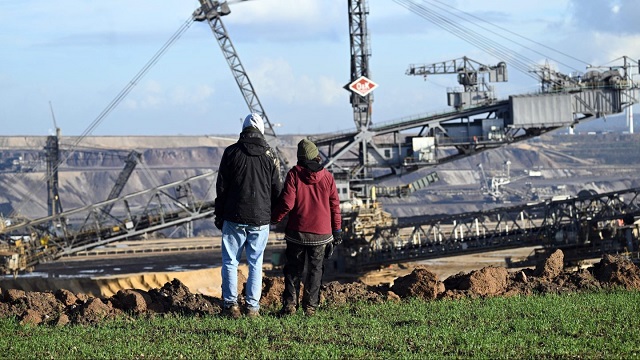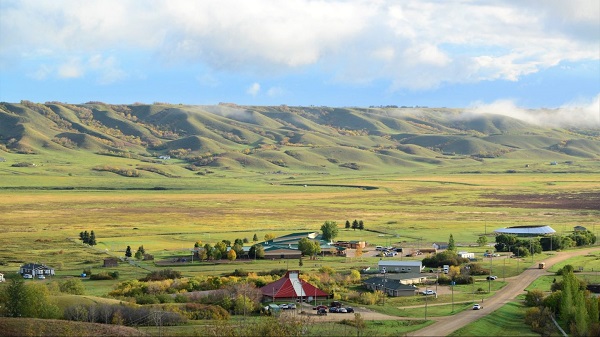Canadian Energy Centre
European governments are reassessing EU-directed green policies amid public unease

From the Canadian Energy Centre
By Shawn Logan
How ‘greenlash’ is forcing Europe to scale back ambitious net zero policies
European governments are beginning to sound the retreat on some foundational net zero policies in the wake of “greenlash” from increasingly overburdened citizens.
Russia’s invasion of Ukraine in 2022 prompted European governments to begin pivoting away from cheap Russian natural gas, which Europe increasingly relied on to backstop a laundry list of ambitious green policies.
But despite pledges by the European Union to “divest away from Russian gas as quickly as possible,” nearly 15% of overall EU gas imports still came from Russia in the first half of 2023, while the amount of liquefied natural gas (LNG) imported from Russia actually increased by 39.5% compared to the same period in 2021, prior to the Ukraine invasion.
Energy security and affordability have become central issues for Europeans amid a persistent global energy crisis, and that’s translated into a rethink of what had once seemed like unassailable green policies across Europe.
Here’s a look at how some countries are dealing with the new global reality:
Germany
Nothing is more symbolic of Europe’s retreat from its net zero ambitions than Germany seeing a wind farm dismantled to make room for the expansion of a lignite coal mine just outside of Dusseldorf.
And no European country has been more affected by the changing energy landscape than Germany, which introduced its multi-billion dollar Energiewende program in 2010, calling for a broad phaseout of fossil fuels and nuclear power, replacing them primarily with wind and solar power.
Today, without cheap and reliable natural gas backups due to sanctions against Russia, Germany has gone from Europe’s economic powerhouse to the world’s worst performing major developed economy, facing “deindustrialization” due to skyrocketing energy costs.
In addition to extending its deadline for shutting down coal plants until 2024, the German government has also scrapped plans for imposing tougher building insulation standards to reduce emissions as well as extending the deadline on controversial legislation to phase out oil and gas heating systems in homes, a decision the government admits will make it impossible to reach the country’s 2030 emissions targets.
A major car manufacturer, Germany’s opposition to an EU-wide ban on the sale of new combustion vehicles by 2035 softened the legislation to allow exceptions for those that run on e-fuels.
Germany’s quest for reliable energy exports prompted Chancellor Olaf Scholz to travel to Canada to make a personal appeal for Canadian LNG. He was sent home empty handed, advised there wasn’t a strong business case for the resource.
Great Britain
Britons have grown increasingly concerned about the cost of net zero policies, despite being largely supportive of striving for a greener future.
A YouGov poll in August found while 71% generally favoured Great Britain’s aim to reduce carbon emissions to net zero by 2050, some 55% agreed that policies should only be introduced if they don’t impose any additional costs for citizens. Only 27% agreed reaching the goal was important enough to warrant more spending.
That shift in public sentiment prompted Prime Minister Rishi Sunak to pump the brakes on some key policies enacted to reach the U.K.’s legally binding target of reaching net zero emissions by 2050.
In September, the government delayed its looming ban on new gas- and diesel-powered cars by five years to 2035, while also extending its phaseout of gas boilers in homes and suggesting exemptions for certain households and types of property.
“If we continue down this path, we risk losing the British people and the resulting backlash would not just be against specific policies, but against the wider mission itself,” Sunak said of the potential consequences of maintaining strict net zero policies.
The U.K. government also gave the green light for hundreds of new North Sea oil and gas licences, citing the need to bolster both energy security and the nation’s economy.
France
France’s net zero ambitions enjoy an advantage compared to its European peers due in large part to its significant fleet of nuclear power stations, which provide around 70 per cent of its electricity.
However, President Emmanuel Macron has often opted for a more pragmatic approach to reaching climate targets, noting any energy transition can’t leave citizens disadvantaged.
“We want an ecology that is accessible and fair, an ecology that leaves no one without a solution,” Macron said in September after ruling out a total ban on gas boilers, instead offering incentives to those looking to replace them with heat pumps.
Macron also famously dropped a proposed fuel tax in 2018 that sparked sweeping yellow vest protests across France when it was announced.
France has also extended the timeframe of its two remaining coal plants to continue operating until 2027, five years later than the plants were originally set to be shuttered.
Italy
Feeling the impacts of the global energy crisis, Italy has begun reassessing some of its previous commitments to transition goals.
Earlier this year, Italy pushed back on EU directives to improve the energy efficiency of buildings, which Italy’s national building association warned would cost some $400 billion euros over the next decade, with another $190 billion euros needed to ensure business properties met the required standards. The Italian government has called for exemptions and longer timelines.
Italy also warned the European Commission it would only support the EU’s phase out of combustion engine cars if it allows cars running on biofuels to eclipse the deadline, while further questioning a push to slash industrial emissions.
Paolo Angelini, deputy governor at the Bank of Italy, warned a rapid abandonment of fossil fuel-driven industries could have a devastating impact.
“If everybody divests from high-emitting sectors there will be a problem because if the economy does not adjust at the same time, things could blow up unless a miracle happens in terms of new technology,” he said.
Poland
Like Italy, Poland has dug in its heels against some EU net zero initiatives, and is actually suing the EU with the goal of overturning some of its climate-focused legislation in the courts.
“Does the EU want to make authoritarian decisions about what kind of vehicles Poles will drive and to increase energy prices in Poland? The Polish Government will not allow Brussels to dictate,” wrote Polish Climate and Environment Minister Anna Moskwa on X, formerly known as Twitter, in July.
In addition to looking to scrap the EU’s ban on combustion engine cars by 2035, Warsaw is also challenging laws around land use and forestry, updated 2030 emissions reduction targets for EU countries, and a border tariff on carbon-intensive goods entering the European Union.
With some 70% of its electricity generated by coal, Poland is one of Europe’s largest users of coal. And it has no designs on a rapid retreat from the most polluting fossil fuel, reaching an agreement with trade unions to keep mining coal until 2049.
Netherlands
The political consequences of leaning too far in on net zero targets are beginning to be seen in the Netherlands.
In March, a farmer’s protest party, the BBB or BoerBurgerBeweging (Farmer-Citizen Movement), shook up the political landscape by capturing 16 of 75 seats in the Dutch Senate, more than any other party, including the ruling coalition of the Labor and Green Parties.
The upstart party was formed in 2019 in response to government plans to significantly reduce nitrogen emissions from livestock by 2030, a move estimated to eliminate 11,200 farms and force another 17,600 farmers to significantly reduce their livestock.
What followed were nationwide protests that saw supermarket distribution centres blockaded, hay bales in flames and manure dumped on highways.
In November, Dutch voters will elect a new national government, and while BBB has dropped to fifth in polling, much of that support has been picked up by the fledgling New Social Contract (NSC), which has vowed to oppose further integration with EU policies, a similar stance offered by the BBB. The NSC currently tops the polls ahead of the Nov. 22 election.
Canadian Energy Centre
Why nation-building Canadian resource projects need Indigenous ownership to succeed

Chief Greg Desjarlais of Frog Lake First Nation signs an agreement in September 2022 whereby 23 First Nations and Métis communities in Alberta will acquire an 11.57 per cent ownership interest in seven Enbridge-operated oil sands pipelines for approximately $1 billion. Photo courtesy Enbridge
From the Canadian Energy Centre
U.S. trade dispute converging with rising tide of Indigenous equity
A consensus is forming in Canada that Indigenous ownership will be key to large-scale, nation-building projects like oil and gas pipelines to diversify exports beyond the United States.
“Indigenous ownership benefits projects by making them more likely to happen and succeed,” said John Desjarlais, executive director of the Indigenous Resource Network.
“This is looked at as not just a means of reconciliation, a means of inclusion or a means of managing risk. I think we’re starting to realize this is really good business,” he said.
“It’s a completely different time than it was 10 years ago, even five years ago. Communities are much more informed, they’re much more engaged, they’re more able and ready to consider things like ownership and investment. That’s a very new thing at this scale.”
 John Desjarlais, executive director of the Indigenous Resource Network in Bragg Creek, Alta. Photo by Dave Chidley for the Canadian Energy Centre
John Desjarlais, executive director of the Indigenous Resource Network in Bragg Creek, Alta. Photo by Dave Chidley for the Canadian Energy Centre
Canada’s ongoing trade dispute with the United States is converging with a rising tide of Indigenous ownership in resource projects.
“Canada is in a great position to lead, but we need policymakers to remove barriers in developing energy infrastructure. This means creating clear and predictable regulations and processes,” said Colin Gruending, Enbridge’s president of liquids pipelines.
“Indigenous involvement and investment in energy projects should be a major part of this strategy. We see great potential for deeper collaboration and support for government programs – like a more robust federal loan guarantee program – that help Indigenous communities participate in energy development.”
In a statement to the Canadian Energy Centre, the Alberta Indigenous Opportunities Corporation (AIOC) – which has backstopped more than 40 communities in energy project ownership agreements with a total value of over $725 million – highlighted the importance of seizing the moment:
“The time is now. Canada has a chance to rethink how we build and invest in infrastructure,” said AIOC CEO Chana Martineau.
“Indigenous partnerships are key to making true nation-building projects happen by ensuring critical infrastructure is built in a way that is competitive, inclusive and beneficial for all Canadians. Indigenous Nations are essential partners in the country’s economic future.”
Key to this will be provincial and federal programs such as loan guarantees to reduce the risk for Indigenous groups and industry participants.
“There are a number of instruments that would facilitate ownership that we’ve seen grow and develop…such as the loan guarantee programs, which provide affordable access to capital for communities to invest,” Desjarlais said.
 Workers lay pipe during construction of the Trans Mountain pipeline expansion on farmland in Abbotsford, B.C. on Wednesday, May 3, 2023. CP Images photo
Workers lay pipe during construction of the Trans Mountain pipeline expansion on farmland in Abbotsford, B.C. on Wednesday, May 3, 2023. CP Images photo
Outside Alberta, there are now Indigenous loan guarantee programs federally and in Saskatchewan. A program in British Columbia is in development.
The Indigenous Resource Network highlights a partnership between Enbridge and the Willow Lake Métis Nation that led to a land purchase of a nearby campground the band plans to turn into a tourist destination.
“Tourism provides an opportunity for Willow Lake to tell its story and the story of the Métis. That is as important to our elders as the economic considerations,” Willow Lake chief financial officer Michael Robert told the Canadian Energy Centre.
The AIOC reiterates the importance of Indigenous project ownership in a call to action for all parties:
“It is essential that Indigenous communities have access to large-scale capital to support this critical development. With the right financial tools, we can build a more resilient, self-sufficient and prosperous economy together. This cannot wait any longer.”
In an open letter to the leaders of all four federal political parties, the CEOs of 14 of Canada’s largest oil and gas producers and pipeline operators highlighted the need for the federal government to step up its participation in a changing public mood surrounding the construction of resource projects:
“The federal government needs to provide Indigenous loan guarantees at scale so industry may create infrastructure ownership opportunities to increase prosperity for communities and to ensure that Indigenous communities benefit from development,” they wrote.
For Desjarlais, it is critical that communities ultimately make their own decisions about resource project ownership.
“We absolutely have to respect that communities want to self-determine and choose how they want to invest, choose how they manage a lot of the risk and how they mitigate it. And, of course, how they pursue the rewards that come from major project investment,” he said.
Canadian Energy Centre
Saskatchewan Indigenous leaders urging need for access to natural gas

Piapot First Nation near Regina, Saskatchewan. Photo courtesy Piapot First Nation/Facebook
From the Canadian Energy Centre
By Cody Ciona and Deborah Jaremko
“Come to my nation and see how my people are living, and the struggles that they have day to day out here because of the high cost of energy, of electric heat and propane.”
Indigenous communities across Canada need access to natural gas to reduce energy poverty, says a new report by Energy for a Secure Future (ESF).
It’s a serious issue that needs to be addressed, say Indigenous community and business leaders in Saskatchewan.
“We’re here today to implore upon the federal government that we need the installation of natural gas and access to natural gas so that we can have safe and reliable service,” said Guy Lonechild, CEO of the Regina-based First Nations Power Authority, on a March 11 ESF webinar.
Last year, 20 Saskatchewan communities moved a resolution at the Assembly of First Nations’ annual general assembly calling on the federal government to “immediately enhance” First Nations financial supports for “more desirable energy security measures such as natural gas for home heating.”
“We’ve been calling it heat poverty because that’s what it really is…our families are finding that they have to either choose between buying groceries or heating their home,” Chief Christine Longjohn of Sturgeon Lake First Nation said in the ESF report.
“We should be able to live comfortably within our homes. We want to be just like every other homeowner that has that choice to be able to use natural gas.”
At least 333 First Nations communities across Canada are not connected to natural gas utilities, according to the Canada Energy Regulator (CER).
ESF says that while there are many federal programs that help cover the upfront costs of accessing electricity, primarily from renewable sources, there are no comparable ones to support natural gas access.
“Most Canadian and Indigenous communities support actions to address climate change. However, the policy priority of reducing fossil fuel use has had unintended consequences,” the ESF report said.
“Recent funding support has been directed not at improving reliability or affordability of the energy, but rather at sustainability.”
Natural gas costs less than half — or even a quarter — of electricity prices in Alberta, British Columbia, Ontario, Manitoba and Saskatchewan, according to CER data.
“Natural gas is something NRCan [Natural Resources Canada] will not fund. It’s not considered a renewable for them,” said Chief Mark Fox of the Piapot First Nation, located about 50 kilometres northeast of Regina.
“Come to my nation and see how my people are living, and the struggles that they have day to day out here because of the high cost of energy, of electric heat and propane.”
According to ESF, some Indigenous communities compare the challenge of natural gas access to the multiyear effort to raise awareness and, ultimately funding, to address poor water quality and access on reserve.
“Natural gas is the new water,” Lonechild said.
-

 2025 Federal Election2 days ago
2025 Federal Election2 days agoRCMP Whistleblowers Accuse Members of Mark Carney’s Inner Circle of Security Breaches and Surveillance
-

 2025 Federal Election2 days ago
2025 Federal Election2 days agoMEI-Ipsos poll: 56 per cent of Canadians support increasing access to non-governmental healthcare providers
-

 Health2 days ago
Health2 days agoTrump admin directs NIH to study ‘regret and detransition’ after chemical, surgical gender transitioning
-

 Business13 hours ago
Business13 hours agoChina, Mexico, Canada Flagged in $1.4 Billion Fentanyl Trade by U.S. Financial Watchdog
-

 Daily Caller11 hours ago
Daily Caller11 hours agoTrump Executive Orders ensure ‘Beautiful Clean’ Affordable Coal will continue to bolster US energy grid
-

 2025 Federal Election2 days ago
2025 Federal Election2 days agoBureau Exclusive: Chinese Election Interference Network Tied to Senate Breach Investigation
-

 2025 Federal Election22 hours ago
2025 Federal Election22 hours agoTucker Carlson Interviews Maxime Bernier: Trump’s Tariffs, Mass Immigration, and the Oncoming Canadian Revolution
-

 Autism2 days ago
Autism2 days agoAutism Rates Reach Unprecedented Highs: 1 in 12 Boys at Age 4 in California, 1 in 31 Nationally




